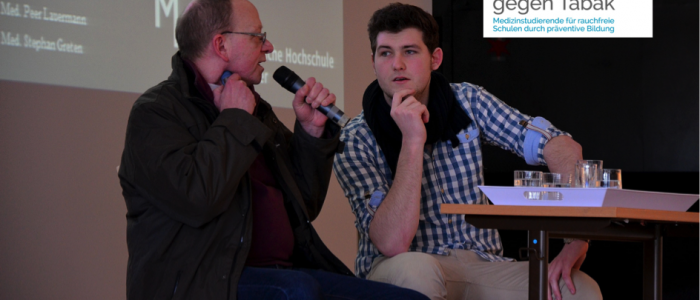Interview with Marco Haertlé, Supervisor of EaT Hannover, Germany
It is 8.37 on Monday morning at the Leibniz School in Hannover. Marco Haertlé is sitting with a patient who is missing his larynx on the stage in front of about 140 seventh graders. It’s no easy task to get the attention of children this age, but on this particular Monday morning it’s quiet in the hall. ‘Why did you first start to smoke? What was your motivation? How old were you?’ begins Marco Haertlé. The patient holds a device to his voice box and begins to speak. A few questions later Marco hands the microphone over to the students, who are allowed to ask the patient their own questions. ‘Bringing affected patients from the University Hospital into schools so that the students can get a realistic picture of the possible consequences is an integral part of the EAT program. Above all, it gives them the opportunity to ask their own questions.’ Marco Haertlé is 24 years old and is among the best students in his year – he has just been awarded a scholarship from the German Academic Scholarship Foundation. He began his experimental doctoral thesis in Hannover. Alongside his studies he works a number of hours every day in the lab. Next year, he is set to continue his research at Harvard. And on top of that, with fellow student Peer Lauermann for over a year, Marco has been responsible for an EAT group, which has visited over 900 students this academic year alone. How does he do it? What motivates Marco?
‘I consider it a privilege to study Medicine,’ begins Marco. He pauses for a moment. ‘We take in a huge amount of knowledge during our studies. I see it as my duty to pass on this knowledge. That will also be my duty later on as a doctor or scientist. That being said, I see no reason to wait until I receive my medical license. It’s also really enjoyable working together with 12-13 year old schoolchildren. They are still so easy to inspire and at a phase in their lives, when nothing is too late.
And how does Marco manage to reach so many students? ‘Now it’s the schools that are coming to us. But I must make something clear at this stage: EAT is about teamwork. Without my group, which works together enthusiastically, nothing would work. Peer Lauermann raised that with me in the foundation phase, the core concepts that we adapted for our purposes came from Gießen. Thank you very much to everyone who made it possible!’
What are the plans for EAT Hannover in 2014? ‘Titus Brinker, the founder of the Giessen group, sent me a draft for an elective course a few weeks ago. We also want to integrate ourselves fully into the teaching here and the dean is on our side. That is what’s great about the project: the groups support each other and share their experience. We are a network and work together towards a goal. We are always looking to improve. It’s possible that our work here in Hannover might also contribute to the scientific evaluation that is currently ongoing in Gießen and Frankfurt.’
More information and images about our educational work can be found here

